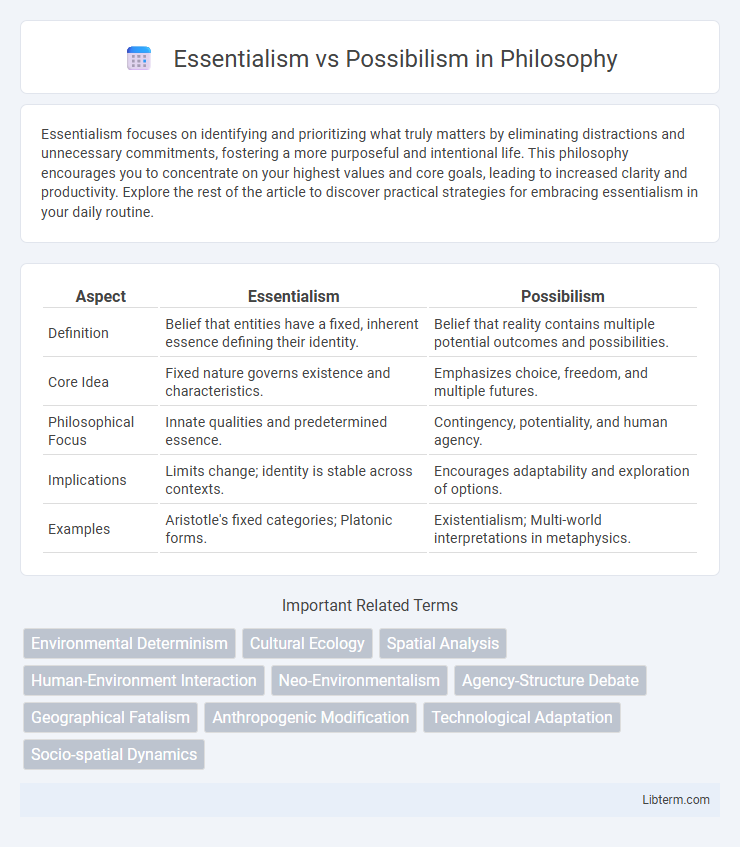Essentialism focuses on identifying and prioritizing what truly matters by eliminating distractions and unnecessary commitments, fostering a more purposeful and intentional life. This philosophy encourages you to concentrate on your highest values and core goals, leading to increased clarity and productivity. Explore the rest of the article to discover practical strategies for embracing essentialism in your daily routine.
Table of Comparison
| Aspect | Essentialism | Possibilism |
|---|---|---|
| Definition | Belief that entities have a fixed, inherent essence defining their identity. | Belief that reality contains multiple potential outcomes and possibilities. |
| Core Idea | Fixed nature governs existence and characteristics. | Emphasizes choice, freedom, and multiple futures. |
| Philosophical Focus | Innate qualities and predetermined essence. | Contingency, potentiality, and human agency. |
| Implications | Limits change; identity is stable across contexts. | Encourages adaptability and exploration of options. |
| Examples | Aristotle's fixed categories; Platonic forms. | Existentialism; Multi-world interpretations in metaphysics. |
Understanding Essentialism and Possibilism
Essentialism posits that natural landscapes and human behavior are determined by inherent, unchanging characteristics, emphasizing the influence of physical geography on societal development. Possibilism counters this by arguing that humans have the agency to overcome environmental constraints through technological innovation and cultural adaptation, highlighting human creativity in shaping the environment. Understanding these theories is crucial for analyzing the dynamic relationship between the environment and human activity in geographic studies.
Historical Origins of the Debate
The debate between Essentialism and Possibilism originated in early 20th-century geography, stemming from differing views on human-environment interactions. Essentialism, rooted in environmental determinism, argues that natural environments dictate human behaviors and societal development. In contrast, Possibilism emerged as a reaction, emphasizing human agency and the role of cultural and technological adaptation in shaping geographic outcomes.
Key Principles of Essentialism
Essentialism emphasizes that certain traits or characteristics are inherent, fixed, and define the true nature of entities or phenomena. This perspective asserts that these essential qualities determine identity and behavior, limiting variation and change. Key principles include the belief in immutable essences, hierarchical classifications, and the prioritization of intrinsic properties over external influences.
Core Concepts of Possibilism
Possibilism emphasizes the role of human agency and creativity in shaping the environment, challenging the deterministic view of Essentialism that geography rigidly defines human behavior. It posits that while environmental conditions set certain constraints, humans possess the capacity to modify, adapt, and innovate beyond these limitations. This core concept highlights the dynamic interaction between physical surroundings and cultural development, allowing diverse societal choices and technological advancements.
Essentialism vs Possibilism: Main Differences
Essentialism asserts that individuals' behaviors and traits are predetermined by inherent, unchangeable essences, often linked to biology or destiny, while Possibilism emphasizes human agency and the capacity to adapt choices within environmental constraints. Essentialism views social and cultural characteristics as fixed, whereas Possibilism promotes flexibility and multiple potential outcomes shaped by human decision-making. The main difference lies in Essentialism's deterministic outlook versus Possibilism's emphasis on adaptability and opportunity in shaping human experience.
Influences on Human Geography
Essentialism emphasizes that geographic phenomena are determined by inherent natural factors such as climate, topography, and resources, which shape human behavior and cultural traits. Possibilism counters this by stressing human agency, arguing that while the environment sets certain constraints, humans adapt, innovate, and modify their surroundings through technology and social organization. The debate influences human geography by shaping perspectives on environmental determinism, cultural development, and spatial decision-making processes.
Contemporary Examples in Practice
Essentialism in contemporary education emphasizes fixed student abilities and standardized curricula, exemplified by traditional testing methods in countries like Singapore and Japan, where core knowledge mastery is prioritized. Possibilism is reflected in progressive education models such as Finland's personalized learning approaches, which adapt teaching to diverse learner potentials and encourage creativity and critical thinking. Corporations like Google implement possibilist principles by fostering innovation through flexible work environments and valuing diverse skillsets beyond predefined roles.
Critiques and Limitations of Both Approaches
Essentialism faces criticism for its deterministic view that oversimplifies human behavior by attributing fixed traits to individuals or groups, ignoring social and environmental influences. Possibilism is limited by its sometimes overly optimistic emphasis on human agency, potentially underestimating structural constraints such as economic and political factors. Both approaches struggle to fully reconcile the complex interplay between innate characteristics and external conditions in shaping outcomes.
The Relevance in Modern Environmental Discourse
Essentialism, emphasizing fixed environmental determinism, often limits understanding of human adaptability in ecological contexts. Possibilism recognizes multiple potential interactions between humans and environments, supporting sustainable development amidst changing climates and resource constraints. Modern environmental discourse leverages possibilism to promote resilient policies that align with ecological variability and socio-economic dynamics.
Future Perspectives: Bridging Essentialism and Possibilism
Future perspectives on Essentialism and Possibilism emphasize integrating the deterministic foundations of Essentialism with the adaptive, open-ended potential of Possibilism, fostering a more comprehensive understanding of human potential and societal development. Emerging research in cognitive science and cultural studies demonstrates how essential traits can coexist with diverse possibilities shaped by environment and choice, highlighting the dynamic interplay between inherent characteristics and external influences. This bridging approach promotes interdisciplinary frameworks that facilitate holistic policy-making and personalized growth strategies, maximizing both stability and innovation in evolving contexts.
Essentialism Infographic

 libterm.com
libterm.com